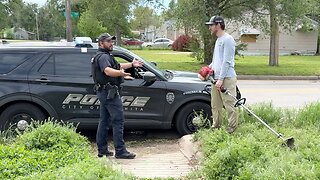Premium Only Content

Beautiful Dog Mom ❤️😍
The flaws in modern pit bull advocacy
Its true. The dogs that are victims of BSL (breed specific legislation), regardless of how it is we label them, need advocacy to protect them. However, the method by which the vast majority of advocates use may be counterproductive to their end goal. The method these people use has to do with people representing their dogs as sweet, cuddly, family pets - dogs that they call pit bulls or “pibbles”. They dub them as nanny dogs and portray them as their babies. While this may sound like a plausible way to melt the hearts of hardened people who just want to ban all bully breeds, all it does is create misconceptions surrounded around the American Pit Bull Terrier. And yes, it may sound like an innocent attempt at ending breed stereotypes, but this agenda unintentionally fuels high bite statistics, fosters irresponsible ownership, spreads misinformation, endangers the American Pit Bull Terrier and puts dogs that are not American Pit Bull Terriers at a heightened risk of being taken away. Let’s talk about mislabeling.
Often times you will hear pit bull advocates say that “pit bull” is not a breed, but an umbrella term that encompasses many breeds and types of dogs. When you use the term pit bull as a descriptor of any dog that fits a certain, predetermined phenotype (usually a blocky head, floppy ears, stocky build) you create the idea that nearly any dog in the bully breed family is a pit bull. This means there is a huge number of “pit bulls” and a proportionate number of attacks for the media to cover. Unless you treat the pit bulls as a single breed (the American Pit Bull Terrier), their bite statistics will always be higher. The more dogs of a type there are, the more attacks there will be.
Some commonly mislabeled dogs are:
-Staffordshire Bull Terrier, American Staffordshire Terrier, XL American Bully, American Bulldog, Pocket American Bully, or a Mutt.
Another thing cited frequently is the idea that pit bulls are nanny dogs. Aside from being untrue (Pit bulls were never called nanny dogs and that was never their purpose) this concept can promote irresponsible ownership and yes, dog bites. Responsible dog owners know that trusting a dog around young children is a recipe for disaster. Small children have little or no boundaries or self control. They will tug on tails, pull on ears, play with jowls and poke at eyes. As a result of this behavior, a dog can be provoked to bite or snap. People will then report it as unprovoked or “out of nowhere”, because often times the signs of stress are subtle and unclear to a little kid. Fostering the notion of nanny dogs is only promoting irresponsibility and attacks.
Luckily, many pit bull advocacy groups are recognizing that pit bulls are not nanny dogs. It’s not too late to accept this. The myth comes from Lillian Rant, who quoted the Staffordshire Bull Terrier as the “nursemaid dog” in a New York Times article in 1971. She was president of the SBT club of America at the time. She made that up to better the image of the Staffordshire Bull Terrier, which was viewed as a fighting dog.
If you’re advocating for pit bulls, you inherently are advocating for the APBT. When pit bull advocates describe the breed as cuddly fur-babies that thrive off of attention and snuggles, it makes the owners of true working APBT’s appear to be neglecting their outdoor dogs. The American Pit Bull Terrier is an extremely driven dog. True APBT’s are dog aggressive and likely to carry a genetic propensity for gameness. Advocating that these dogs just want to be family pets will either:
-Put them in the wrong hands of people who suspect their dog will be a calm pet with a kind demeanor towards everything (improper management of any high drive dog can lead to bites)
- Paint responsible APBT owners (who condition their dogs & work them) as abusive people and possibly lead them to get their dogs taken.
EDUCATED ADVOCACY IS KEY!!
Ultimately, today’s pit bull advocates have their hearts in the right place. But unfortunately, the modern
-
 2:14:15
2:14:15
RattlesnakeTV
7 days ago $0.08 earnedJordan Peterson Takes On 20 Atheists! LIVE Debate Review
8503 -
 LIVE
LIVE
Badlands Media
18 hours agoThe Narrative Ep. 24: Legacy of Devolution
10,966 watching -
 47:21
47:21
SB Mowing
9 days agoI was not expecting the POLICE to show up MID-JOB
10.2K24 -
 2:25:24
2:25:24
vivafrei
12 hours agoEp. 266: SCOTUS Allows Trump TPS Revocations! Glenn Greenwald-Gate! Alex Jones! Trans Madness & MORE
105K130 -
 LIVE
LIVE
SpartakusLIVE
7 hours agoNEW Easter Egg, SPECIALIST || Duos w/ @GloryJean followed by quads later!
1,299 watching -
 1:39:21
1:39:21
Sarah Westall
4 hours agoRemote Viewing the Future: Quantum, Financial Reset, Transhumanism & more w/ The Future Forecasters
83.9K12 -
 2:18:42
2:18:42
TheSaltyCracker
5 hours agoUkraine Pokes The Bear ReeEEEStream 06-01-25
103K263 -
 2:45:56
2:45:56
IsaiahLCarter
6 hours agoAPOSTATE RADIO 016: WPATH's Pseudoscientific Insanity (feat. Mia Hughes)
43.3K1 -
 LIVE
LIVE
TheBeardedNerdd
4 hours ago🔴 LIVE- (Splitgate 2) Gaming with CRGOODW1N Streamer/Creator W/ @SelfmadeGGs
250 watching -
 2:11:47
2:11:47
TruthStream with Joe and Scott
1 day agoRoundtable with Lewis Herms, Mark Abrahams and Patriot Underground live #435
39.2K4